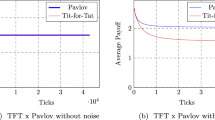Abstract
In this paper, we describe an acceleration method for evolutionary systems based on Iterated Prisoner’s Dilemma (IPD). In the systems, agents play IPD games with other agents, and strategies which earn more payoffs will gradually increase their ratio in the total population. Most computation time of the systems is occupied by IPD games, which are repeatedly played among the agents. In our method, repetition of moves in IPD games are detected, and payoffs by those moves are calculated at once by multipliers. In order to maximize the number of units for IPD games on one FPGA, multipliers are shared by the agents. We have implemented a system with the method on XC2VP100, and the speedup by the method is about four times compared with a system without the method.
Preview
Unable to display preview. Download preview PDF.
Similar content being viewed by others
References
Poundstone, W.: Prisoner’s Dilemma. Doubleday, New York (1992)
Lindgren, K.: Evolutionary Phenomena in Simple Dynamics. In: Artificial Life II, pp. 295–312 (1991)
Lindgren, K., Nordah, M.G.: Cooperation and Community Structure in Artificial Ecosystems. In: Artificial Life I, pp. 15–37 (1994)
Yamaguchi, Y., Maruyama, T., Hoshino, T.: High Speed Hardware Computation of Co-evolution Models. In: 5th European Conference on Artificial Life, pp. 566–574 (1999)
Yamaguchi, Y., et al.: A Co-processor System with a Virtex FPGA for Evolutionary Computation. In: Grünbacher, H., Hartenstein, R.W. (eds.) FPL 2000. LNCS, vol. 1896, pp. 240–249. Springer, Heidelberg (2000)
Author information
Authors and Affiliations
Editor information
Rights and permissions
Copyright information
© 2007 Springer Berlin Heidelberg
About this paper
Cite this paper
Yamaguchi, Y., Kanazawa, K., Ohke, Y., Maruyama, T. (2007). An Acceleration Method for Evolutionary Systems Based on Iterated Prisoner’s Dilemma. In: Diniz, P.C., Marques, E., Bertels, K., Fernandes, M.M., Cardoso, J.M.P. (eds) Reconfigurable Computing: Architectures, Tools and Applications. ARC 2007. Lecture Notes in Computer Science, vol 4419. Springer, Berlin, Heidelberg. https://doi.org/10.1007/978-3-540-71431-6_34
Download citation
DOI: https://doi.org/10.1007/978-3-540-71431-6_34
Publisher Name: Springer, Berlin, Heidelberg
Print ISBN: 978-3-540-71430-9
Online ISBN: 978-3-540-71431-6
eBook Packages: Computer ScienceComputer Science (R0)




